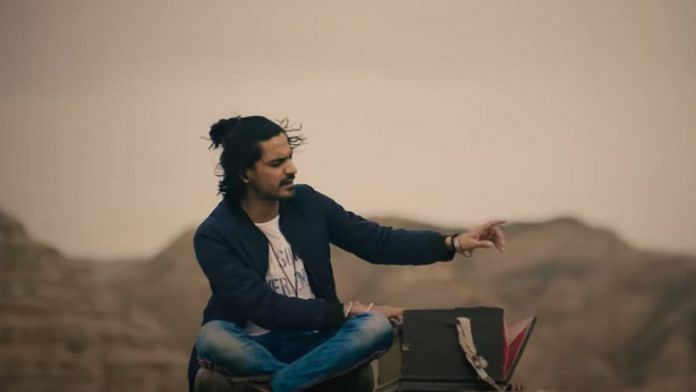For years, Zeeshan Ali was a little-known Pakistani singer. But around six months ago, he posted a 30-second clip of himself performing a slow rendition of Nusrat Fateh Ali Khan’s famous qawwali, Saadgi. It became an overnight sensation. The clip got over a million views, and by May, Ali’s Instagram followers’ count had ballooned to over 1.3 lakh. What surprised him though was that almost all his new fans were Indians.
Ali’s performances herald the rise of a new kind of pared down Instagrammable music that relies solely on the keyboard and heartfelt lyrics. He evokes a bygone era through the timeless melodies of Nusrat Fateh Ali Khan, Noor Jehan, and Mohammed Rafi. In an era dominated by lo-fi and autotune, he has shown that there is still an appetite for poetry and simple vocals.
Ali, hailing from Lahore, takes pride in his Indian follower base, considering them a discerning and well-read audience.
“In Pakistan, I feel artists are still struggling to accept their identities. We are still dealing with the dilemma of whether music is prohibited in Islam or not. In India, music is considered a part of worship, which is why I believe that Indian audiences are more literate when it comes to appreciating good music,” he said.
From actors Sonam Bajwa, Aditi Rao Hydari and Ayushmann Khurrana to director Hansal Mehta to ghazal maestro Ghulam Ali, Zeeshan Ali has been receiving abundant praise from Indian celebrities who have been utilising his voice to create reels or sharing his music on their social media profiles.
Finding his audience
A third-generation migrant from India, Ali’s great grandfather Balak Singh was a Sikh from Jalandhar in Punjab. He grew up in a Shia family and his interest in music evolved after singing at religious gatherings.
“My introduction to serious and beautiful poetry happened through my childhood. We would sing these in compositions of ragas. Later, when I went to learn from my Guru who is also from the Gwalior gharana, I could connect the dots,” he said.
He realised the melodies he was singing the religious poetry in, were all derived from the classical ragas.
By 2019, Ali had already made a name for himself with a stirring rendition of Tere Jiya Hor Disdah on a Pakistani music show Nescafe Basement. Some of his popular takes on old classics include Mehdi Hassan’s Gulon Mein Rang Bhare, Farida Khanum’s Dil Jalane Ki Baat Karte Ho, and Surinder Kaur’s Chan Kithan.
Last year in Lahore, Ali found himself jamming with friends in an empty studio. Someone in the group recorded the impromptu session and Ali uploaded the Clip on his YouTube page where it got around 2,000 views.
But everything changed when he put it on Instagram.
The first track that captured the hearts of listeners was Saadgi, a beautiful composition written by Pakistani poet Saba Akbarabadi and immortalised by the legendary Nusrat Fateh Ali Khan.
“I always thought my music would only appeal to a niche audience,” Zeeshan said. “I would sing with those expectations in mind. But I was pleasantly surprised by how viral my videos became. It made me realise that there are people of my generation who appreciate good poetry.”
Also read: ‘Thief, have shame, stop ruining songs’—Pakistani singer gives T-Series lesson on ‘plagiarism’
‘New Ali Sethi’
The ghazal and qawwali space in India is seeing a revival by a new generation of singers such as Shilpa Rao, Pratibha Singh Baghel, and Himani Kapoor, who have been sharing their performances on social media with great success.
Some of Ali’s fans have even compared him to another Pakistani singer Ali Sethi, whose Coke Studio track Pasoori broke almost all records.
While he holds Sethi in high regard for his role in revitalising and popularising the ghazal genre among the younger generation, Ali also recognises the importance of artistic individuality.
“The last ghazal album released in Pakistan was back in the 1980s. Since then, that space has remained vacant. Ali Sethi, in a way, revived that genre and brought it into the spotlight, especially among the younger audience,” he said.
Ali, who finds solace in performing in intimate mehfils (gatherings), recently left Pakistani and Indian sensation Fawad Khan awe-struck with his performance of a song from the hit show Humsafar. Khan had requested Ali to sing that song and his subtle smile after on hearing the song made for a viral social media video.
Fawad was invited to a private mehfil where Ali was performing. As claimed by Ali, in a feeble voice, Khan requested to sing him the title song of his famous show Humsafar. In the video, Khan can be seen enjoying the performance with a subtle smile.
Ecstatic by his recent success, Ali is inspired to continue on his musical journey. He is working on his upcoming album, which will feature his ghazal compositions for which he is collaborating with young poets from Pakistan.
With this, he hopes to see ghazal and poetry back in the mainstream—not just in Pakistan, but in India as well.
(Edited by Ratan Priya)



